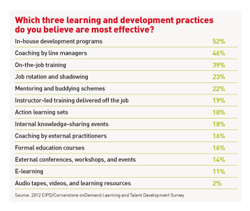TD Magazine Article
Learning and Development in the United Kingdom
A recent survey by the Chartered Institute of Personnel Development (CIPD) sheds some light on the state of leadership, learning, and talent development in the United Kingdom.
Mon Jul 09 2012


A recent survey by the Chartered Institute of Personnel Development (CIPD) sheds some light on the state of leadership, learning, and talent development in the United Kingdom. The most significant finding of the 2012 CIPD/Cornerstone onDemand Learning and Talent Development Survey is that nearly three-quarters of organizations in the United Kingdom report a deficit of management and leadership skills. Two-thirds of respondents say senior managers lack these skills, and the vast majority (85 percent) report leaders at the line manager level are found wanting these skills.
"We believe this issue primarily is related to a lack of management education qualifications," says John McGurk, adviser, learning and talent development, CIPD. McGurk believes the skills shortage must be combated through development efforts such as coaching and people management skills training.
As far as future trends, nearly half of survey respondents identified "greater integration between coaching, organizational development, and performance management to drive organizational change" as the most common organizational change expected to affect learning and development during the next two years.
Additionally, the survey reveals that many learning and development professionals in the United Kingdom are not cognizant of contemporary or emerging concepts in the profession. When asked to measure their awareness level of a variety of new learning analysis methods, a majority of respondents say they "haven't heard of these." Examples include neurochemistry of learning (71 percent unaware), deep practice and expertise (63 percent unaware), and "flow" and blissful productivity (60 percent unaware).
"The learning and development professional needs to be a challenger, a provocateur, bringing these new concepts to the business … otherwise the businesses will look elsewhere to fill those needs," McGurk says.
